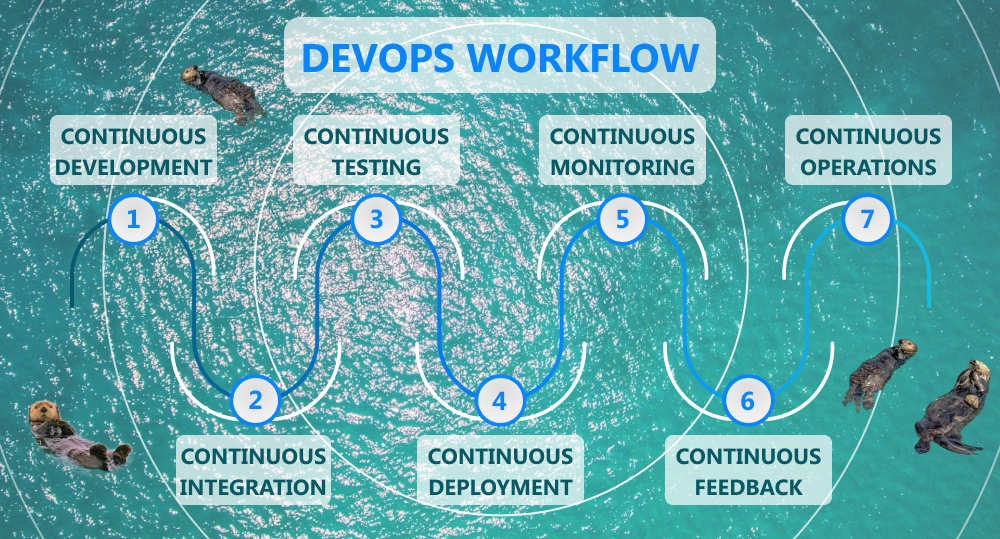Is going through the process of DevOps outsourcing worth it? According to a study by Atlassian in 2020, almost all (99%) of respondents reported that DevOps outsourcing had hugely beneficial results for their company. Given these numbers, it’s very safe to say that DevOps will be an advantageous venture for your business. With the assistance of a reputable DevOps outsourced service provider, your company can profit from DevOps concepts and ensure high-quality software, as well as enhanced user engagement.
Keep reading, and we’ll answer all your questions about how they operate and more!
written by:
Stanislav Makarovets
DevOps Engineer
Contents
What Is DevOps?
DevOps (development and operations) is best defined as teams of individuals collaborating together to design, construct, and deploy reliable software at breakneck speed. DevOps acts as the link between software development and operations teams, allowing for faster delivery through automation, efficient communication, and continuous growth.
The DevOps method builds upon this multifunctional strategy to deliver the most efficient process for your projects. Using a DevOps development system involves determining the enhancement of the workflow and quality delivery of your software by promoting a spirit of teamwork throughout the development cycle.
DevOps reflects a shift in IT culture's thinking. It concentrates on continuous improvement and quick software delivery by drawing on lean principles and systems theory. Performance is dependent on the capacity to foster an environment of responsibility, enhanced teamwork, understanding, and delegation of responsibilities for corporate goals.
Can I Outsource DevOps?
Yes! If anything, it's one of the top and most recommended options for a novice enterprise and entrepreneur. Unlike an in-house team, there are no additional costs you need to allocate when you go through a DevOps outsourcing company.
DevOps Workflow Stages
When opting for DevOps outsourcing, a primary consideration revolves around the potential disparities in workflow compared to an in-house team. Managing an in-house team demands an extension of your budget to cater to their on-site requirements, but the advantage lies in having absolute control over their workflow. On the other hand, outsourcing entails the hiring of freelancers, diminishing some level of control. You must place reliance on their expertise and trust that they will provide consistent updates throughout the entire process. However, rest assured, the software development lifecycle remains consistent for both approaches, eliminating the need to disrupt your office dynamics.
The workflow operates as an ongoing loop, iterating through all operations until the desired product quality is attained. A helpful visualization is to envision it as an infinity symbol, symbolizing the imperative nature of continuous collaboration and development throughout the entire cycle.
1. Continuous Development
Your outsourced DevOps team will organize the project and begin programming during the continuous development phase. This happens once all objectives are discussed and all parties are well-informed of decisions made. Because the developers are obligated to create new features whenever additional features or execution concerns arise, it is a continuous and flexible approach.
2. Continuous Integration
The continuous integration step is widely regarded as the most important component of the entire workflow since it requires developers to regularly update the code and introduce new features. To guarantee software quality, regular upgrades necessitate evaluation after every new installment.
3. Continuous Testing
Prior to, during, and following the integration of new elements, several test procedures are carried out. A quality assurance team steps in to invest a great deal of work and guarantee bug-free software, while an outsourced DevOps engineer would recommend adopting automation instead. Automated testing is an excellent technique to save both energy and time in delivering error-free products.
4. Continuous Deployment
The continuous deployment process involves distributing the finished code to the appropriate servers. Configuration management which facilitates seamless deployment and containerization are two components of DevOps that ensure consistency across all circumstances.
5. Continuous Monitoring
Detecting system malfunctions, such as limited memory or inaccessible servers, is the purpose of continuous monitoring. The developers are responsible for detecting and resolving these problems so that software functionality stays excellent at all times. If the issue is significant, they will go through the entire DevOps cycle to identify a resolution and eliminate possible additional concerns.
6. Continuous Feedback
Collecting feedback via media platforms is an exceptional approach to gain new insights into how your program operates from the perspective of the user. Outsourcing DevOps pros can assist you in developing an organized strategy to gather and process input from numerous sources in order to develop a broader picture of what's happening currently and what to improve.
7. Continuous Operations
Continuous operations is the final stage, which is aimed at decreasing maintenance downtime. Downtime can cost businesses as much as $5,600 every minute, totaling $300k or more each hour. When a company outsources DevOps, they can put in place a strategy that minimizes downtime and ensures that software functions are always accessible.
Stage
Software Used
1. Continuous Development
The software used is fully dependent on the type of project and the client’s preferred internal workflow and practices.
2. Continuous Integration
While numerous technologies serve the purpose of continuous integration, CircleCI, Gitlab CI, and Jenkins are among the most notable.
3. Continuous Testing
The current most popular tools for continuous testing are Selenium, Allure, Eggplant, and TestSigma used in automation testing.
4. Continuous Monitoring
Prometheus, Sensu, DataDog, and Splunk are used to monitor statistics and record numerous software operations.
5. Continuous Feedback
There are hundreds of tools for engaging with feedback, ranging from basic Google Forms for focused surveys to analytics platforms like Pendo.
6. Continuous Deployment
Industries use tools such as Ansible, Puppet, or Terraform to handle configuration during deployment, whereas technologies such as Docker serve as a backup to assist the stage's scalability.
7. Continuous Operations
Container management systems like Kubernetes and Docker are commonly combined to conserve valuable resources while also ensuring your company's software is deployed sooner.
In-House vs. Outsourcing DevOps
Why DevOps outsourcing? Why not just get an entire in-house team, there's no difference, right? Actually, there is quite a big one when it comes to DevOps services, so let's dig deeper into this. In a global report in 2021 done by Upskilling IT, 47% of respondents had trouble with the DevOps transformation process when it came to the implementation of DevOps. This is largely due to the DevOps culture that we will touch on later in the benefits and pros and cons sections. The obstacles that come with this don't just affect team members but spread through the organization, procedures in place, and technologies used.
When creating an in-house DevOps team, 58% of respondents in the previous survey stated that locating and hiring talented employees was another significant issue. 48% also said that retaining competent DevOps specialists was an issue they’d encountered.
The only true benefits of an in-house DevOps team are quite minimal. Yes, you do have total control over products during development, and if you need any additional resources, they are easily manageable. You also have the flexibility to create the structure you require with whatever tools you want.
The downsides to this structure, though, are far more lengthy. Not only is it difficult to draw in and keep experts in most locations of the world, but there is also the constant duty to fund office expenditures, bonuses, and benefits. You also need to consider how long it will take to build the necessary structure and processes from scratch.
Now let’s say you’ve gone through all of this trouble, and everything should be smooth sailing from here on out for your in-house team. Not just yet; there are more drawbacks to go over, so hold your horses. Having an in-house staff means that they'll be sidetracked by internal corporate activities, causing them to lose concentration and productivity. Furthermore, as a consequence of this environment, they can become used to performing the same sort of assignments and working conditions, leading to few chances for growth in other areas.
So as you can see, the results of going through DevOps outsourcing versus hiring an in-house team are very different, and outsourcing comes out on top. Of course, there are cases where outsourcing DevOps is not in your best interest, particularly if you're an organization with over 150 employees looking to expand to 500+. In this scenario, an in-house DevOps team that specializes in specific areas is a beneficial solution.
Benefits of DevOps Outsourcing Services
Access to Niche Skills
An advantage of outsourcing DevOps is having access to experts like database administrators, certified engineers, and more. Locating DevOps engineers is tricky enough, but hiring specialists with unique or specialist capabilities can be much more challenging when assembling an in-house team. Which is why outsourcing DevOps provides your company with extra skills that you can select from a global talent pool of DevOps expertise to better disperse responsibilities and allocate elaborate tasks.
Access to Skilled DevOps Expertise
Two of the main reasons companies want to outsource DevOps are the scarcity of DevOps skills and rising wages from the increased demand. To provide users with extremely knowledgeable or talented individuals, DevOps as a Service companies have a secure screening and hiring procedure. Furthermore, you are not restricted to the DevOps professionals in your area and can tap into a worldwide talent network.
Cost-Effective Expertise
One important benefit of outsourcing DevOps is simpler and less expensive hiring. Businesses can avoid the time-consuming and costly recruitment process since outsourcing businesses have skilled specialists with all the necessary credentials in one place. With the outsourced DevOps approach, there's no reason to invest money or time in training in-house personnel.
Fast and Efficient Process
The DevOps as a Service industry has embedded the DevOps culture at the core of its operations. Outsourcing to the proper supplier can decrease development cycles while improving software service quality. As shown previously, automation, continuous testing, continuous monitoring, and continuous improvement are used to improve the standard of the code base and ultimately the finished result.
Flexibility
Let's consider an outcome that could happen: an outsourced DevOps provider gives you a DevOps engineer that appears to be a poor match or lacks the key abilities you need. Unlike an in-house team, where this is more difficult to reverse, with outsourcing, this isn't an issue! You can simply request that the supplier find you another DevOps team. You cannot achieve this type of flexibility with an in-house hire. Had this been an in-house team employee, you would have needed to spend more time and resources on dismissal, compensation, and legal concerns, not to mention restarting the recruiting process.
Pros and Cons of DevOps Outsourcing
Pros
Affordable Solutions
DevOps strives to automate the majority of operations, which in turn saves you both resources and time. This means that while repetitive operations are being programmed, development teams can concentrate on more essential tasks. Collaborating with an outsourced DevOps engineer gives your firm an appropriate pricing plan that is generally significantly less expensive than hiring an in-house specialist.
Improved Flexibility and Quality
Since DevOps engineers employ the continuous approach, problems and defects will hardly go under the radar. Plausible flaws are generally eliminated throughout the testing and monitoring phases, guaranteeing that your organization receives a solution that performs optimally.
Improved Risk Assessment
Outsourced teams often have extensive expertise in the areas you require, which means they're fully familiar with how things are done. A DevOps engineer will use optimal methods to prevent risks and address issues before they occur.
Quicker Workflows
Companies that work with a consulting or outsourcing firm receive maximum advantage of top-tier DevOps knowledge. This requires reliable and open dialogue, automation of the majority of operations, and constant product innovation. Professional engineers will use the best DevOps practices right from the start, resulting in a substantially faster standardized development cycle.
Cons
Solid Cooperation Is Needed
You can certainly see that DevOps values excellent cooperation among colleagues. Everybody has different backgrounds, and getting them to collaborate is tricky. Implementing the DevOps culture gradually would be extremely beneficial in this situation.
Specialized Expertise Is Vital
Collaboration with a DevOps team necessitates technical expertise such as CI/CD procedures, infrastructure, testing tools, and other essential elements to create proper product specifications. You will not be able to establish the job and monitor the outcomes unless you have the necessary engineering knowledge available.
Workplace Disruption
The DevOps culture causes a shift in your organization that will affect the way your team is used to operating. Your staff members need to concentrate on product-centric, full-lifecycle models rather than project-based ones. This involves bringing together several teams to work toward a common objective. It might be a difficult task, particularly in conservative contexts where leadership abilities are lacking.
As you can see, the pros far outweigh the cons, but that doesn't mean you should ignore them. Making an informed decision is one of the best things you can do for your business to ensure the best outcome possible.
FAQ
What is DevOps outsourcing?
DevOps outsourcing entails contracting with an outside team or organization to deliver a number of services:
- Apply management tools to provide reliable operation, scalability, and automation for your storage devices, servers, and network technology.
- Create a proactive system monitoring approach for you that will help you to minimize downtime while increasing customer service.
- Maintain careful oversight on seamless CI/CD deployment and test automation procedures to respond to concerns within their project capacity promptly or notify an authorized collaborator for a solution
- Create and deploy CI/CD methods to use dependable CI platforms, remove issues at an early stage, and benefit from quality control.
Can DevOps be outsourced?
Yes! In fact, when outsourced, DevOps services offer a plethora of benefits to you and your business. Going through an outsourcing company gives you unparalleled access to all the talent available to you beyond the scope of your immediate area.
What do the benefits of DevOps outsourcing include?
The business benefits of hiring DevOps offshore include cost-effectiveness, niche and skilled expertise. Another great benefit is the convenience when it comes to flexibility and fast and efficient processes applied to your projects.
What exactly does DevOps do?
DevOps is a concept that combines the words "development" and "operations" to form this phrase. It is a development technique that connects software development with IT operations. It seeks to foster an agile interaction between the two, allowing businesses to build and deploy frequent updates to their products far more quickly than the more traditional 'waterfall' development model. In summary, DevOps engineers are the bridge between development and deployment, ensuring that everything is set up to deliver changes promptly and smoothly. Essentially, DevOps comes down to teamwork and eliminating the surrounding obstacles.
Is DevOps still in demand?
Yes, DevOps services are still hugely in demand. In fact, CircleCi forecast that the DevOps industry would expand from $2.9 billion to $8 billion by 2022. Not only that, but the global DevOps market was anticipated to be worth 4,311.95 million USD in 2020, with a projected value of 5,114.57 million USD in 2021. And it is expected to reach 12,215.54 million USD by 2026 at a compound annual growth rate of 18.95%.
What does “offshore” mean in software?
Offshore software development is the process of developing applications in your own area with the assistance of a team based in a remote location. Offshore software teams are primarily a type of business procedure outsourcing in which the service provider is located in another part of the world.
Can DevOps work with outsourced development?
In short, yes. DevOps can collaborate with global outsourced development teams. However, please be aware that although this could add extra challenges to establishing DevOps cultural principles in your team, the strategy is often feasible, particularly if carried out within a long-term time frame.
DevOps Methodology Wrapped Up
DevOps is an amazing way for businesses that are interested in implementing this model to ensure the continuous delivery of goods and services while also meeting end-user preferences and demands. DevOps outsourcing provides instant access to key skills that might be hard to find in your area. Outsourcing DevOps offers organizations a number of benefits dependent on their level of success, such as better cooperation, quicker time to market, fewer product failures, reduced service time, and lower operational expenditures — all without having to develop all the operations from the onset.
Don’t let the prospect of outsourcing DevOps intimidate you! Contact us, and we’ll do the work for you!

Contacts
Feel free to get in touch with us! Use this contact form for an ASAP response.
Call us at +44 151 528 8015
E-mail us at request@qulix.com










